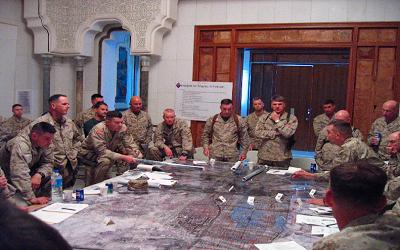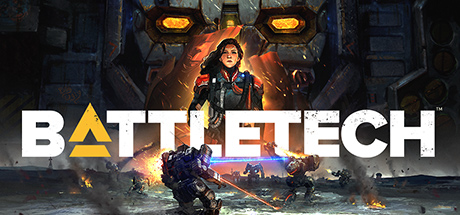Jeffro Johnson weighed in on yesterday's post:
When the #BrOSR says, "AD&D is a wargame", they do not mean that it is an SPI style hex and chit game or an Avalon Hill bookcase game or a GMTGames product. The wargame that sets the template for D&D is Arneson's world-spanning Napoleonics campaign which no one alive plays today. https://t.co/uEH0SWsQO3 pic.twitter.com/3luNOxqTxY
— Cardinal Jefforieu (@JohnsonJeffro) April 12, 2023
He's right. Most tabletop wargamers today don't get this either because they place specific scenarios by design (Avalon Hill/GMTGames/etc.) or the culture of play focuses around that as if it were a tournament environment (anything popular, such as SpaceMace39K and BattleTech).
That sounds bad, until you see that proper wargame campaigns are indeed very popular- as videogames. Therefore the concepts behind proper tabletop RPG campaign play are not lost; they need only return to the medium that birthed them.

What The Hell Are You Doing?
A wargame campaign is a simulation of the execution of a plan to achieve specific political and economic objectives, as defined by that party's sovereign.
To that end, the player(s) are alloted a certain amount of resources and provided a certain about of intelligence on the location(s) wherein the campaign shall take place and what the likely opposition forces are. Win and Loss Conditions are specified; these are often asymetrical.
The player(s) faces opposition not from the Referee, but from other player(s) that control other parties in the campaign.
The Referee is a strictly neutral arbiter whose presence is to guarantee fair play by all parties, as all parties must contend with Fog of War in addition to economic concerns (men, material, morale, etc.) and political ones. The consequences of one's actions carry over from one engagement to the next. Players are required to address complications caused by the consequences of player actions as well as unforeseen events. (e.g. unexpected weather shifts, tectonic events, etc.) The latter are administered by the Referee by a scheme arranged before play begins.
Players are responsible for ensuring that resources are spent wisely, that spent resources are replenished at best speed, and that advancement towards the campaign objective is maintained until it is won or someone else gets their fulfilled first.
"That sounds weird."
My brother in Christ, I just described most of the wargames available on Steam. Let me pull up three popular ones.



If I want to add base-building and similar elements, I can point you straight to Command & Conquer. Heroes with troops? Pick a Total War game, or any of the historical simulations like Age of Empires.
The Analog Form
Imagine playing that in the 1970s.
You're not sitting at a terminal. You're meeting up at a wargame club, or with the Referee, handing in your written orders for the week's turn. You get a report from the Referee on the results of your orders (that don't result in playing a battle), in addition to the effects of others' orders as well as any uncontrolable events (like your monarch dying of disease or old age). If your results prompt a battle scenario, you get your miniatures ready to play that weekend.
Maybe it's a full battle. Maybe it's a skirmish- and it is in the skirmish that we got our proto-RPG: Braunstein.
If it's the latter, you're unlikely to dispatch your general; that's the work of a junior officer- often a much junior officer. So you control that man and his command at the table, and the other player does likewise. The Referee aribtrates the game as it plays out, and then Bob announces that he--as mayor of the town in question--is packing up the treasury and heading for the hills before either side can loot its contents. Dick, running a gang of bandits made up of deserters, is inciting both sides to commit war crimes so he can get the treasury. This simple skirmish is now a four-sided affair.
Each player has a specific scenario objective. They are not symmetrical. Two of them are directly pursuing campaign objectives; the other two are not, as their generals are not even in this theater, so they're playing third parties with skin in the game. The winner is the first to get his scenario objective achieved, but regardless the consequences are carried over to the next battle, the next round of orders, and so on until the campaign is won or everyone loses.
"So what is that then?"
Congratulations, that is the brilliant chaos that became the basis for proper RPG campaign play. Asymetrical player-versus-player play, with players playing different parties at different times, pursuing overarching objectives and contending with consequences--some of which are inflicted by others, or by chance, because Life Is Not Fair--that must be accounted and answered for. Routes are opened or closed, making it necessary to change the plans. Vital personnel are lost, or gained, again changing the plans. Resources gained or spent, and so on- all forcing the player(s), like the above-pictured officers, to cope and adjust until either they win or victory becomes impossible and the only move left is to quit in defeat.
The RPG Medium Defined
This is the brilliance of the RPG as a medium, and it is why every step away from the wargame roots results in declining popularity- and thus resorting to skinsuiting and other frauds to compenstate. Very few games other than Advanced Dungeons & Dragons 1st Edition capture this magic, and all of them are among the enduring classics of the hobby.
You too can #winatrpgs. Just start treating as it is, as a wargame.
No comments:
Post a Comment
Anonymous comments are banned. Pick a name, and "Unknown" (et. al.) doesn't count.